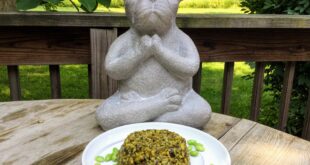
By Jakeb Brock
There are many schools of meditation, but interestingly, they all take us to the same place. This place might be described as a state of stillness or relaxation, wherein our spiritual consciousness rises to the forefront of our awareness. It is like a landscape—a vast, wide-open, endless plateau—where being supersedes doing. The only things we find ourselves doing in this place are watching and waiting.
From our plateau of being, it’s as if we have a bird’s-eye view of our inner realm. Little by little, we begin to discern inner activity that we may not have noticed before—thoughts and emotions that have been going on all along but without us paying much attention to them. This process is like shining a light into the dark hidden crevices of our psyche. That is why it is called “enlightenment.” It is also a process whereby we make the inner activities that have been happening unconsciously, conscious. We often refer to it under the broad heading: “consciousness.”
It is not long before this kind of watching (or observation of our inner workings) becomes second nature to us. It becomes a familiar process that requires little effort or discipline on our part. We click into it and go from there. Not only can it be an interesting and fascinating pastime; it can even be fun. There is an element of growth, progress, and positive discovery about it that we find strengthening and energizing. It is especially edifying when we come to recognize a particularly troublesome old pattern of thought or emotion—one that has been at work within us for so long that it has come to define an aspect of our personality. (For example, if it involves anger or jealousy, others come to look at us as if we’re angry or jealous.) Not only do we recognize that it has come to define us, but we also see that it has been controlling us. We come to understand that observing and recognizing inner workings such as these, and bringing them into the light of consciousness, can have a profoundly liberating effect. That is why we often feel exhilarated when this happens. It is as if the simple act of watching has become a power in our lives. It does not require too much of us and can bring wonderful results.
The second part of our meditative doing—waiting—might prove to be a little more challenging for us. It can be just as rewarding as watching. But, it is generally more difficult for us to practice and benefit from.
Watching is something that we human beings can do simply as an act of our will. It is a natural human function and comes relatively easy for us. But, the ability to wait is in many ways a gift of grace. Waiting does not come naturally for us and is not something we generally like or choose to do. It is also a spiritual quality—one that involves those difficult conceptual realities of faith, belief, and trust. When we practice waiting, we must also believe and trust that the spiritual infusion we are waiting for is a real power and not merely imaginary or hoped-for.
One of the things that watching accomplishes is a sort of emptying of our psyche’s content. It exposes our unwanted thoughts and emotions, which causes them to lose steam and gradually drop away. It is the unconscious hidden aspect of their operation that energizes them and lends them a degree of tenacity. When our watchful presence exposes them, they tend to become disoriented and lose that edge of tenacity. At that point, it is not long before they disappear. Like kids playing a game that no longer feels fun to them, these old unconscious patterns of thought and emotion, once exposed by the light of consciousness, no longer find what they have been doing very appealing. They quit the game altogether.
Gradually, as we persist in our practice of mindfulness, our inner world becomes more and more emptied and stillness ensues. It is as if those old disturbing patterns of thought and emotion had been occupying a lot of space in our psyche, and when they vacate there is a vacuum that is created. It is at this point that waiting will come into prominence in our experience. We intuitively realize that we can’t refill that newly created vacuum inside of us with just any content. To do so would be inviting the old toxic patterns of thought and emotion to come back in and control us again. We also gain the vision that the fresh new content we are yearning for must be life-affirming and powerful; it must be inspiring and elevating; it must be healing and electrifying, and it must be eternal and holy. In short, it must be divine. Otherwise, there is little point in practicing mindfulness and emptying ourselves of those old negative mental patterns. We learn to wait rather than to take matters into our own hands. What are we waiting for? Often we are not sure. Something inside of us tells us that there is goodness and power inherent in this universe—spiritual goodness and divine power. If we can just be patient, they will come to us.
It does not take long before we discover that taking this posture of waiting can be a little tricky and even debilitating. While we wait for the divine life to fill us, we find that we are confronted with many of our old systems of belief and must wade through them, sort them out and even revamp them, to be able to keep waiting gracefully. It is not uncommon for this predicament to effectuate an entire reexamining of our belief systems. It may even spur a crisis of faith, in which we find ourselves wondering if universal divinity even exists.
The problem involves the fact that once we have proceeded to empty ourselves through the practice of mindfulness or watching, nothing happens immediately. There we are, empty and waiting to be filled, but that filling does not necessarily take place according to our desire and timetable. We know better than to panic and try to fill the void ourselves, but at the same time, we will probably be asking ourselves: “What’s happening here? I have done the emptying out, now where is the promised filling?” The only answer that comes is: “You have to be patient and learn to wait.” We think it should happen instantly, but the universe has its own intelligence about such matters. It knows us better than we know ourselves. The temptation will be to try to make things happen in our own strength. That is why waiting can trigger a crisis of faith for us. Not only are we being called upon to wait and be patient, but we must also trust that there is something inherent in our universe’s created workings that will eventually fill us with the divine essence.
Moreover, there are very few of us that have had recourse to nurture this kind of faith in our pasts. Our lives in this world have invariably been lived from a stance of Darwinian self-reliance. That is what we were taught to do from the day of our birth. But now our emptying process has demanded that we learn to wait and trust in a higher power—an unseen power that is greater than ourselves. We want to believe that such a power exists, but the actual hands-on trust element can prove elusive for us.
Therefore, the posture of waiting may present us with a difficult challenge. It may cause us to search our hearts afresh about our long-held belief system. We may find ourselves asking questions such as these: Is there really a life force inherent in our universe that operates in this capacity and fills human beings with new divine content once they have emptied themselves of all the lifeless human stuff? And if so, what is it like? How do we recognize it? How can we know with certainty when this filling has taken place? These are valid questions that need truthful answers—answers that are there for the finding. The real dilemma for us is not grasping the answers; it is whether or not the answers will satisfy us. If the truth about the divine life and its operation does not line up with what we have previously thought or believed and if we are attached to those old beliefs, then we may face a roadblock up ahead. It is absolutely within our capability to learn the truth about the divine, but we have to be willing to let go of the untruths we’ve been clinging to.
The good news is that there is a divine life force operating in our universe. The bad news is that it is not very easy for us to comprehend or relate to it. The divine life force is purely spiritual while we tend to be overly pragmatic, and at times, unspiritual. The divine life is quiet and unassuming while we, based on our former egoic orientation, might be looking for high drama and irrefutable signs. So even if we believe that such a life force exists, we often have trouble accepting how it operates and what it is like.
This universal divine life force is the essence of all that we call spiritual. It is the source of all spirituality. It might seem foreign to us. Humans tend to be forceful and imposing, but the Spirit does not force its way in. It never goes where it is not welcome. Humans tend to view everything through the lens of personalization, but the Spirit is strictly impersonal. So we come to find that the Spirit operates not according to whim or caprice but rather according to absolute immutable scientific principles. It does not judge whether we are deserving or worthy of interacting with the divine. Rather, it waits until we have fulfilled every requirement of receptivity and then moves according to a completely predictable pattern.
What this means is that the promised filling we are waiting for happens with or without our efforts. It is not dependent upon the words we might utter in prayer or how we worship. Rather, it happens strictly based on universal law or principle. That is why waiting eventually pays off.
According to universal law, our filling is activated by nothing more than the emptying of our psyche. Since the Spirit is better attuned than we are to recognizing when this emptying has been sufficiently accomplished, there may be more that we need to do in this arena. That is why we find ourselves waiting. It is not that the spiritual principle of emptying and refilling is faulty; it is simply that the conditions of our emptying must be just so. Then once we have made the necessary corrections, the filling will take place…just as morning follows night or summer follows spring.
Another difficulty for us is that sometimes the filling takes place according to universal law, but we don’t recognize it as such. This usually happens because we were expecting something else to happen. It may be that we had our sights set on a more dramatic demonstration. This can be an almost comical predicament, as we continue to wait even when there is nothing left to wait for.
So, how do we know for certain when the filling has taken place? This is where faith and trust come in. We must have faith in the universe’s immutable created workings and principles. We must trust that if we do our part and align ourselves correctly, the promised filling will invariably take place—whether we recognize it as having done so or not. As we do this, it will not be long before we begin to sense and discern the change in our inner realm. The more we exercise this sixth sense, the more adept we will become at recognizing the Spirit’s activity and influence. Our meditative activities of watching and waiting will have accomplished everything that they were intended to do. We will soon find ourselves moving regularly in the power of the Spirit, as it fills our vessel so full that it begins to flow outward from within us and thereby benefit others.
Jakeb Brock is a spiritual teacher and the author of The New Consciousness: What Our World Needs Most. Visit www.ournewconsciousness.com or www.facebook.com/thenewconsciousness.
 Conscious Community Magazine Dedicated to Elevating Consciousness
Conscious Community Magazine Dedicated to Elevating Consciousness



